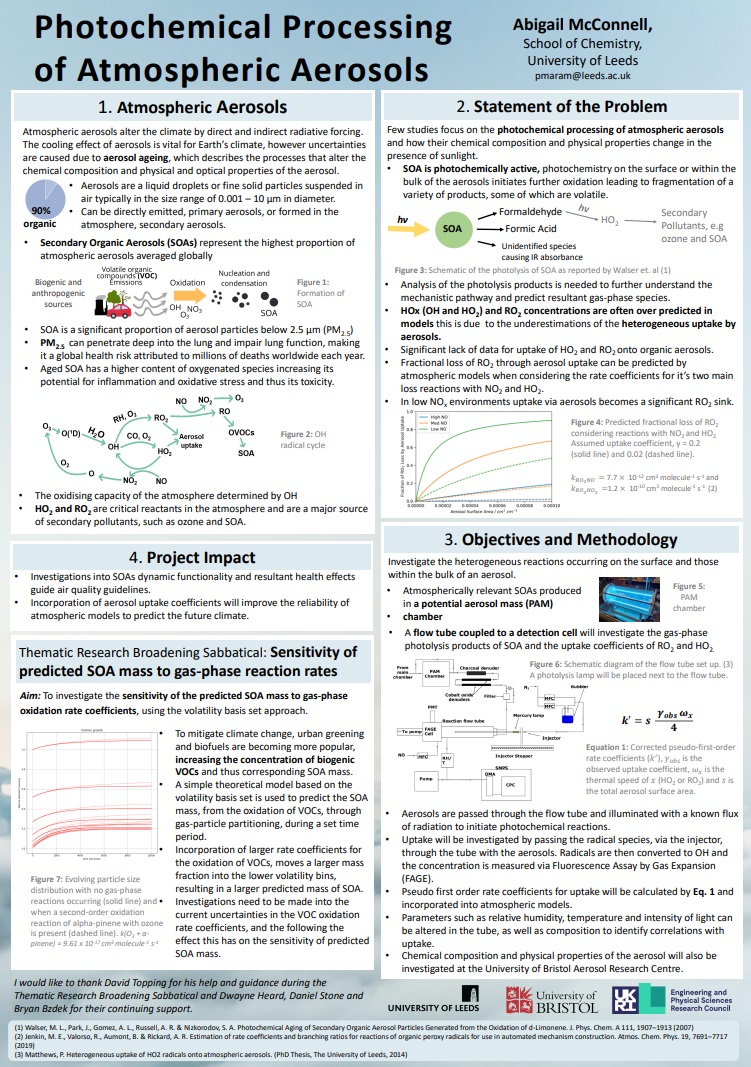Environmental
Understanding the role played by aerosols in cloud droplet formation and climate, the composition of particulate matter in polluted urban environments, and the sources of harmful aerosol from, for example, non-exhaust emissions from transport are key areas of focus in environmental aerosols. CDT projects are exploring the composition of secondary organic aerosol, the properties of dispersed pesticides, and aerosol photochemistry. They are also developing new tools to probe cloud droplets and ice nucleating particles. Projects also extend beyond the Earth’s atmosphere to, for example, studies of Venusian clouds.
Bioaerosol monitors for building control systems
Join the University of Hertfordshire’s Particle Instruments & Diagnostics group to pioneer a low cost, real-time bioaerosol detection system. Mold spores in indoor environments pose significant health risks, exacerbated by poor ventilation and high humidity. This project aims to develop and deploy a novel Bio-OPC, capable of identifying harmful bioaerosols in real-world settings.
You’ll work on laboratory calibration, instrument optimisation, and field deployment, collaborating with Siemens to implement this technology in active workplaces. Your research will contribute to safer indoor environments, reducing health risks and improving air quality.
PhD student: Andi Ramadhani
Cohort: 7
Lead supervisor: Prof. Chris Stopford, Dr Warren Stanley, Dr Jianghan Tian and Dr Dongyu Wang
Institution: University of Hertfordshire
This project is an industry funded studentship supported by Siemens
Controlling Particles, VOC and their Oxidation: Smart Demand Controlled Ventilation for Indoor Environmental Quality and Energy Efficiency
Spending time indoors is the leading route for exposure to hazardous particulate matter. This project will reduce exposure using smart ventilation systems to inhibit formation of aerosol and the introduction of outdoor particles via ventilation. Emerging research shows the negative impact of oxidation of volatile organics and aerosol particle growth on indoor air quality. We will install a smart ventilation system at the University of Surrey, incorporating sensors and adaptive ventilation control, working closely with our industrial partner Rensair. The information gathered will be used to enable improvements to infrastructure that will significantly reduce indoor particulate matter and energy consumption.
PhD student: Doruk Ekingen
Cohort: 7
Lead supervisor: Prof. Prashant Kumar, Matt Johnson
Institution: University of Surrey
This project is an industry funded studentship supported by Rensair
Fusing High Performance Computing and Machine Learning for Scalable and Fast Aerosol Dispersion Simulations
We invite applications for a PhD project focused on accelerating a Lagrangian particle dispersion model to improve atmospheric aerosol research. This project will explore computational optimizations such as parallelization, GPU acceleration, and advanced numerical methods, alongside machine learning integration, to enhance model performance for large-scale simulations. The aim is to improve the accuracy and speed of aerosol transport and transformation simulations, supporting research in air quality and environmental health. The candidate will gain experience in high-performance computing, atmospheric science, and machine learning, contributing to the development of cutting-edge tools for real-time aerosol modeling.
PhD student: Nabeel Akram
Cohort: 7
Lead supervisor: Prof. David Topping
Institution: The University of Manchester
Ice nucleation on atmospheric particles and radiative forcing
The research will understand how soot particles from aeroengines or other atmospheric particles contribute to ice nucleation under laboratory simulated atmospheric conditions to evaluate formation of contrail clouds. High speed imaging will quantify the temporal evolution of ice nucleation on ultrasonically levitated particles and quantify the effects of initial particle material, shape, size and environmental conditions on icing growth rate and ice-particle structure. White light illumination of suspended ice-particles will quantify light absorption and scattering and correlate them to ice-particle structure. The unique measurements will be incorporated in computer models to evaluate the impact of atmospheric ice-particles on global warming.
PhD student: Sukh Brar
Cohort: 7
Lead supervisor: Prof. Marc Stettler and Prof. Yannis Hardalupas
Institution: Imperial College London
Advancing dispersion modelling of radioactivity releases resulting from increasingly frequent Chernobyl Exclusion Zone (ChEZ) wildfire events.
During a wildfire within a radioactive environment, aerosols with a wide range of characteristics are derived. This multi-disciplinary studentship will work with both UK and Ukrainian partners to experimentally derive release dynamics and parameters for the various ‘fuel’ sources within the Chernobyl ‘Red Forest’ to enhance the current modelling and plume dispersion capability.
PhD student: Sujan Lamichhane
Cohort: 6
Lead supervisor: Dr Peter Martin, Prof. Tom Scott, Dr Sarah Millington
Institution: University of Bristol
This project is an industry funded studentship supported by Met Office
Dynamic and Equilibrium Surface Composition Measurements on Surfactant-Containing Aerosol Droplets
Surfactants are important components of aerosol chemical composition, influencing how aerosols activate into cloud droplets and how they are chemically processed. However, the surface tension of microscopic aerosol droplets is poorly constrained due to challenges in both measuring and modelling this property. This exciting project pioneers measurements of the equilibrium and dynamic surface tensions of picolitre droplets containing surfactant mixtures, working closely with international collaborators to identify the basic parameters controlling both cloud droplet activation and aerosol chemical reactivity. The student will gain experience with single droplet levitation approaches, colloid science, and thermodynamic and kinetic models.
PhD student: Mehdi Abou Hamad
Cohort: 6
Lead supervisor: Dr Bryan Bzdek
Institution: University of Bristol
Machine learning strategies for Marine Cloud Brightening
Marine Cloud Brightening (MCB) could offer a feasible way to yield a cooling effect over the oceans. This project aims at using existing data sets and machine learning techniques to develop techniques that can reliably distinguish the number of particles in clouds and their effects, and their susceptibility to MCB, which in due course could help inform optimal MCB strategies. In particular, it will focus on tackling challenges uniquely related to aerosol-cloud interaction: (i) satellite image resolution; (ii) sparsity and noisy data; (iii) spatial and temporal correlation. It will also tackle challenges related to integrating knowledge of ship journeys.
PhD student: Iarla Boyce
Cohort: 6
Lead supervisor: Dr Alice Cicirello
Institution: University of Cambridge
This project is an industry funded studentship supported by Centre for Climate Repair
Integrated modeling of aircraft contrails from plume to regional scale
This project seeks to improve our understanding of the climate effects of aviation beyond just the emitted carbon dioxide. Although several studies have indicated that aircraft condensation trails (contrails) forming on emitted particulates could cause climate impacts comparable to those from aviation carbon dioxide, uncertainty remains regarding the long-term effects of contrails. In this work, a new, open-source, multi-scale approach to contrail modelling will be developed which bridges the gap between existing plume-scale and global-scale models, constrained by satellite observations and high-fidelity modelling of early plume microphysics. This will then be used to produce a new understanding and quantification of the long-term impacts of contrails, including the role of cloud feedbacks.
PhD student: Jack Bartlett
Cohort: 6
Lead supervisor: Dr Sebastian Eastham, Dr Marc Stettler
Institution: Imperial College London
Application of Real-Time Single Particle Integrated AI-Optoelectronic Techniques for Detection and Discrimination of Airborne Biogenic Aerosols in Diverse Atmospheric Environments
Bioaerosols represent the most complex aerosols in the atmosphere. You will work with international collaborators and a major instrument manufacturer to test and characterise a new instrument incorporating physics based digital holography, fluorescence spectroscopy, fluorescence-lifetime and polarisation techniques, all melded into one to detect and classify airborne bioaerosols and non-bioaerosols in real-time. You will conduct laboratory and field experiments with the instrument at a range of locations across the globe (from the Arctic to Antarctica) supported by international co-supervisors providing you with unique supervision training and data support to generate data to expand the scientific community’s knowledge of airborne biomes.
PhD student: Eve Kerr
Cohort: 6
Lead supervisor: Prof. Martin Gallagher
Institution: University of Manchester
Ice nucleation in aerosols containing biomolecules
Ice nucleation in environmental aerosols is an important atmospheric process, but many details are still poorly understood. This project addresses the physical chemistry of heterogeneous ice nucleation by bio-nanoparticles. You will develop apparatus to levitate and freeze water droplets, and gain relevant background through environmental modelling and interaction with the British Antarctic Survey.
PhD student: Fraser Crawford
Cohort: 5
Lead supervisor: Prof. Walther Schwarzacher, Prof. Jonathan Reid
Institution: University of Bristol
Aerosol emissions from future generation aircraft and their impact on climate
The project will develop and use state-of-the-art models to quantify the full impact on climate of aviation emissions from current and future generation aircraft. While recognised as an important climate forcing term, aerosol-cloud interactions are currently not included in global assessments of the aviation impact on climate. The project will directly address this by providing robust estimates of this important but still unquantified effect. This will ensure that the full aviation climate impact is accounted for when designing the best pathways for achieving net-zero carbon emission aviation by 2050, an ambitious target recently set by the aviation industry.
PhD student: Kexin Qiu
Cohort: 5
Lead supervisor: Dr Alex Rap & Prof Benjamin Murray
Institution: University of Leeds
Developing and deploying new sensors for in-situ monitoring of clouds
Clouds form a crucial component of the Earth system, reflecting large amounts of incoming sunlight back into space. Low-cost sensors are needed to allow long-term monitoring of climatically relevant cloud properties, but to-date no such sensor exists. This project will develop and test new sensors for cloud monitoring.
PhD student: Charlie Stainton-Bygrave
Cohort: 4
Lead supervisor: Dr Jonathan Crosier
Institution: The University of Manchester
A Comparative Study of Oxidation Flow Reactors and an Atmospheric Chamber
Secondary Organic Aerosol (SOA) will become an increasingly important atmospheric PM component as primary emissions reduce. Measurement and regulation requires development and evaluation of instruments enabling accelerated SOA formation. This project will work with industry partners to evaluate accelerated oxidation in a new commercial oxidation flow reactor (OFR).
PhD student: Stephen Robertson
Cohort: 4
Lead supervisor: Dr Gordon McFiggans
Institution: The University of Manchester
This project is an industry funded studentship supported by Dekati Ltd.

Eddy Covariance Fluxes of Pesticides in Atmosphere
Pesticides are widely used throughout the world and are essential components in the efficient production of food. However, their atmospheric cycles remain very important and poorly understood transport pathways. You will use a range of advanced aerosol tools and techniques to constrain atmospheric behaviour combining both laboratory and field studies
This studentship is sponsored in partnership with Syngenta.
PhD student: Ujjawal Arora
Cohort: 4
Lead supervisor: Prof Hugh Coe
Institution: The University of Manchester
This project is an industry funded studentship supported by Syngenta.

Interfacial photochemistry in aerosol droplets: chemistry and climate impacts
Aerosol surfaces hold the greatest source of uncertainty for atmospheric chemistry and climate impacts. For example, surface composition determines the ability of atmospheric particles to serve as cloud droplets. This project will study directly light-induced reactivity at the droplet-air interface of individual droplets, linking interfacial composition to atmospheric reactivity.
PhD student: Isabel Quant
Cohort: 3
Lead supervisor: Dr Bryan Bzdek
Institution: University of Bristol
Photochemical Processing of Atmospheric Aerosol
Atmospheric aerosols impact global warming and human health yet chemical transformations at their surfaces in the presence of sunlight are poorly understood. In this project laboratory studies using two complementary approaches will be used to study photo-processing at aerosol surfaces, with the results exploited using a detailed atmospheric model.
PhD student: Abigail McConnell
Cohort: 3
Lead supervisors: Prof Dwayne Heard and Dr Bryan Bzdek
Institution: University of Leeds
Using microfluidic technology to measure and identify biological atmospheric ice-nucleating particles
The formation of ice in clouds is one of the least well understood aspects of our planet’s climate system. Our knowledge of the sources, sinks and global distribution of ice-nucleating particles is lacking. In this project you will use new technologies to better understand biological ice-nucleating particles.
PhD student: Polly Foster
Cohort: 3
Lead supervisor: Prof Benjamin Murray
Institution: University of Leeds
Optical Properties of Venusian Clouds
Venus is completely shrouded in thick clouds. This project will investigate the curious blue absorption in the clouds, which is responsible for the yellowish appearance of the planet and remains unexplained. Laboratory optical studies of candidate cloud droplets, combined with atmospheric modelling, will be used to unravel the mystery.
PhD student: Joanna Egan
Cohort: 2
Lead supervisor: Prof John Plane
Institution: University of Leeds
Towards a better understanding of the lifecycle of Pesticides in the Atmosphere
Pesticides are widely used throughout the world and are essential components in the efficient production of food. However, their atmospheric cycles remain very important and poorly understood transport pathways. You will use a range of advanced aerosol tools and techniques to constrain atmospheric behaviour combining both laboratory and field studies
This studentship is sponsored in partnership with Syngenta.
PhD student: Olivia Jackson
Cohort: 2
Lead supervisor: Prof Hugh Coe
Institution: The University of Manchester
This project is an industry funded studentship supported by Syngenta.

Improving the understanding of the gas/particle partitioning behaviour of organic aerosols in different environmental conditions
Understanding the partitioning of molecular constituents between the gas and particle phases is central to the whole endeavour of aerosol science. This project applies ultra-sensitive techniques to investigate the volatilisation of low and semi-volatile components from aerosol particles, their response to humidity and temperature, and refining predictive tools crucial for understanding air quality.
PhD student: Tom Hilditch
Cohort: 1
Supervisors: Prof Jonathan Reid (Bristol) and Dr David Topping (Manchester)
Institution: University of Bristol
This project is an industry funded studentship supported by DSTL.

Size, sources and transport of the seeds of ice in clouds
Our knowledge of the special aerosol particles which trigger ice formation in clouds is extremely poor. This project will take some of the first ever measurements of ice nucleating particle size in order to better understand their transport.
PhD student: Kathleen Thompson
Cohort: 1
Supervisors: Prof Ben Murray (Leeds) and Prof Catherine Noakes (Leeds)
Institution: University of Leeds

EPSRC CDT in Aerosol Science
University of Bristol
School of Chemistry
Cantock’s Close
Bristol, BS8 1TS
aerosol-science@bristol.ac.uk
Partner Newsletter
Sign up to receive monthly news and updates from the CDT in Aerosol Science, as well as events, training and research webinars.







